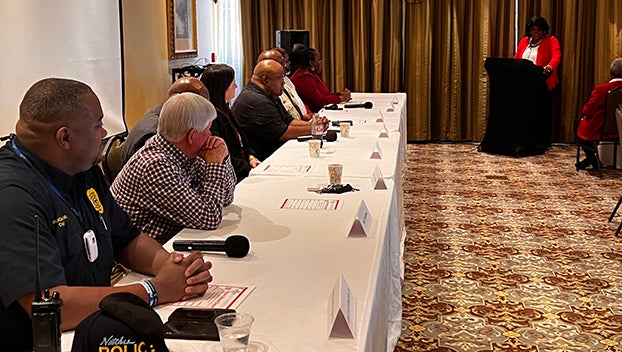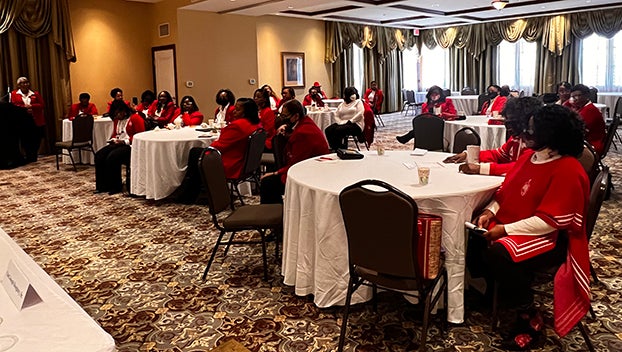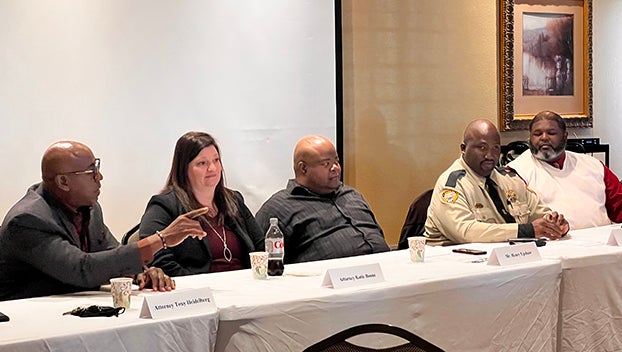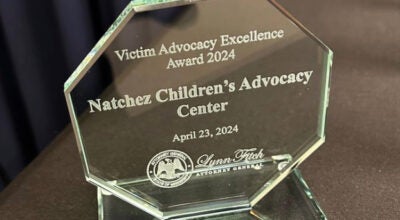Gun violence in Natchez: ‘There’s not one root cause, there’s many’
Published 1:20 pm Monday, February 7, 2022
|
Getting your Trinity Audio player ready...
|
NATCHEZ — What can be done to reduce gun violence among youth in the community?
This question was posed to a group of stakeholders during a panel discussion organized by the Natchez Alumnae Chapter of Delta Sigma Theta Sorority Inc. at the Natchez Grand Hotel on Saturday. The discussion, called “Coffee and Conversation,” is part of the chapter’s Social Action outreach where they attempt to improve lives and solve problems that are important in their community.
Recent back-to-back shootings involving young adults and juveniles in Natchez prompted the organization to take action by inviting law enforcement, attorneys, judges and school administrators to talk about youth crime in Natchez and Adams County in a panel discussion.
The panelists included Natchez Police Chief Joseph Daughtry, Adams County Youth Court Judge Walt Brown, defense attorneys Tony Heidelberg and Katie Boone, Adams County Juvenile Detention Center Director Henry Upshaw, Adams County Sheriff’s Office deputy Keith Myles, Natchez High School Principal Eric Jackson and Natchez Adams School District Deputy Superintendent Zandra McDonald Green.
These leaders provided insight into the issue from their perspective, having worked with many young people involved in violent crimes.
“It starts at home,” Myles said. “As a community, we need to know where our kids are.”
Myles said this pertains to not only parents but also grandparents, neighbors, teachers and friends. In a lot of cases, Myles said children are out and about during the late-night hours in groups without adult supervision, often carrying guns, drugs and paraphernalia that they shouldn’t have.
Ask their parent or guardian where it came from and they have no answer, he said.
“Parents do not need a search warrant to go through their child’s phone,” Boone said. She added that a lot of the answers to what kids are up to nowadays are posted on their social media for all to see.
Green and Jackson said social media also plays a role in their student’s behavior at school. During the first three hours of school is when the majority of fights, sometimes “group fights,” occur, Jackson said.
Brown said this could be because whatever situation that happened overnight or even a week ago has been left to boil over on social media, causing the children emotional distress.
“When I was in school, we didn’t have that problem,” she said, adding the gossip happened over a landline or in person and then would dissipate after a day or two.
Kids are coming to school tired and in distress, because they’re up all night scrolling, she said.
“To get a grip on one root cause for violence in the community is not possible because there are many,” Boone said.
Parents should take time to listen to their children about what is going on in their lives to get to the root of what might be causing some of them to seek out friends by joining gangs or to carry guns, whether it’s to commit a crime or for their protection, Heidelberg said.
“We’ve got to have real conversations with our kids about what is going on and not pacify it,” he said.
Beyond what can be done inside the home, Brown said what has helped reduce youth crime in the past is one-to-one interventions from programs that were offered by Youth Court. In the past, Brown said the Adolescent Offender Program was exceptionally helpful but funding for it was lost from the state level.
He added he is currently working with Heidelberg on implementing a mentorship program where adult male role models would work with kids individually.
Perhaps high school juniors and seniors could also participate in peer courts, where juveniles charged with a misdemeanor offense for the first time appear in a disposition hearing administered by trained youth volunteers, Brown said.
The officials agreed the “scared straight” tactic of having kids spend time behind bars has not helped.
“We need people that care,” Upshaw said. “When kids come in contact with a person that will listen to them and truly cares, that changes their behavior. Packing days on kids for minor infractions does not change their behavior.”
Another way officials are addressing crime is by aggressive community policing, they said.
This has been implemented with the SWAT and VIPER units at the Natchez Police Department, which has helped them confiscate 12 guns in the past two weeks alone, Daughtry said.
“This is not just a Natchez problem, but it is a problem here and there is no doubt about it,” Brown said. “We’re going to have to begin some aggressive policing. … If you see a group of kids out at 1 a.m., you’re going to have to stop them and figure out what is going on.”
The Natchez Alumnae Chapter of Delta Sigma Theta Sorority Inc. thanked each of the panel participants by presenting them with certificates.
“Natchez Alumnae Chapter, Delta Sigma Theta Sorority, Inc. wishes to partner and collaborate with community agencies to make a difference in the lives of youth,” chapter president Angela James said. “How we spend our days is how we spend our lives. I believe in the power of youth. Our youth are the hope of our future. Let us make a difference.”








